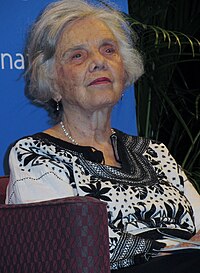Paris (France), 1933
By Flávio Aguiar
 The daughter of World War II refugees, she migrated with her mother from France to Mexico at the age of eight. Alongside Argentine writers Marta Traba and Luisa Valenzuela, she stood out for the diversity of her work and her attention to marginalized people in her journalistic writings, essays, and fiction. She has published books that have remained bestsellers for a long time.
The daughter of World War II refugees, she migrated with her mother from France to Mexico at the age of eight. Alongside Argentine writers Marta Traba and Luisa Valenzuela, she stood out for the diversity of her work and her attention to marginalized people in her journalistic writings, essays, and fiction. She has published books that have remained bestsellers for a long time.
As a chronicler, her literary work engages with her journalistic background, from which several books derive, including Tinísima (1992), whose protagonist is the photographer and political activist Tina Modotti. In the famous Hasta no verte, Jesús mío (1969), the protagonist is inspired by the Mexican revolutionary Jesusa Palancares, whom she met and interviewed.
Poniatowska is committed to giving voice to the female universe, as her compatriot Elena Garro does in a different manner. In the 1970s, she rejected the Xavier Villaurrutia Award for La noche de Tlatelolco, a work in which she reconstructed the historic student massacre. Another work of hers is Juan Soriano, niño de mil años (1998).
In 2005, she published the novel El tren pasa primero, and in 2007, she received the XV Rómulo Gallegos International Award for her body of work. In 2011, she was awarded the Biblioteca Breve Prize from the Spanish publishing house Seix Barral for the book Leonora, about the life of surrealist painter Leonora Carrington. The Mexican government established a literary prize bearing her name, and in 2013, she won the Cervantes Prize.
Content updated on 27/04/2017 18:43.
Translation by ChatGPT.


